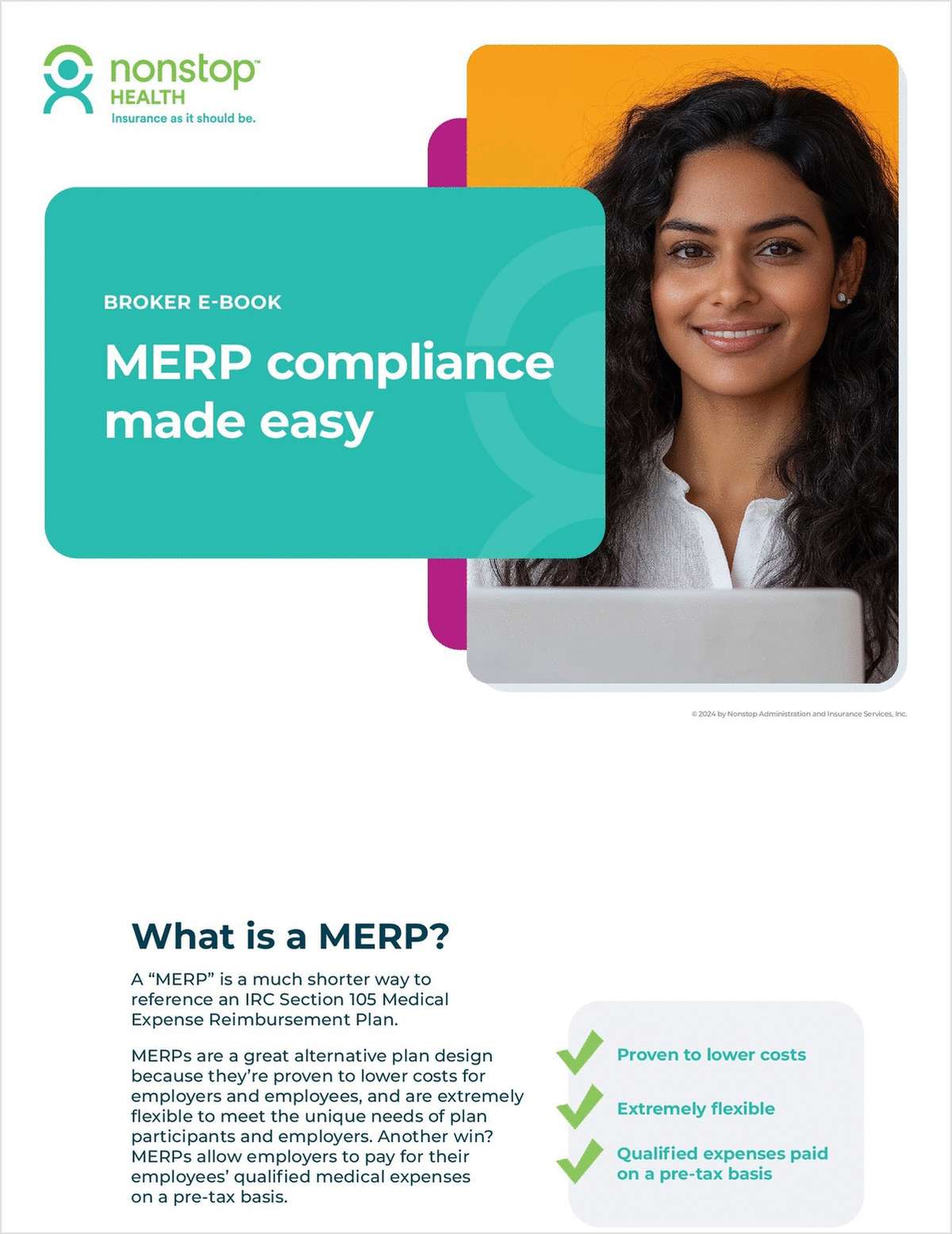An August court decision in U.S. District Court for the Eastern District of Pennsylvania found that an employee discount received through a group voluntary policy constitutes an employer contribution, and therefore disqualifies such products from falling under the Department of Labor’s voluntary benefit safe harbor.
The decision, rendered in a lawsuit brought against Unum Life Insurance Company by a beneficiary of a voluntary disability policy that failed to pay out as promised, confirms what several other federal courts have found: A discounted group voluntary benefit does not qualify for voluntary safe harbor, even when the employee pays 100 percent of the premium.
In 2013, in a separate claim brought against Unum by a beneficiary of one of its voluntary disability policies, a federal court in the District of New Jersey also issued a decisive ruling on the question of whether discounts for plan participants negotiated through a group voluntary benefit – as opposed to an individual voluntary plan – constitute employer contributions.
In that case, McCann v. Unum Provident, the plaintiff was a Unum policyholder who sued Unum after the insurer stopped paying benefits on his disability plan. The plaintiff, who had purchased a group voluntary DI policy in the early 1990s through his employer, alleged that Unum improperly determined that he was no longer totally disabled – and then cut off his monthly disability benefits.
The question here – whether Unum was right to terminate these benefits – is similar to that in any other breach-of-contract claim brought against insurance companies. Under state law, an individual can sue an insurance company for allegedly breaching its contractual obligations.
The federal Employee Retirement Income Security Act, passed in 1974, was designed to protect the rights of participants in employer-sponsored retirement and health plans.
ERISA was written to pre-empt state law, a reality that carried tremendous consequences when policyholders began bringing claims against voluntary insurance providers.
While ERISA grants health plan participants the right to sue plan sponsors and plan service providers, ERISA does not give the right to a trial by jury, according to court documents. Rather, claims brought under ERISA are heard in federal court, and decided on by a federal judge.
That matters substantially for voluntary benefit providers like Unum. ERISA is widely regarded as a complex law, and the claims against insurance companies and their contracts also tend to be complicated. Insurance companies tend to view a federal bench trial – with a federally appointed judge overseeing the dispute – as more advantageous to their defense. On the other hand, plaintiffs’ attorneys often prefer a trial by jury — a typical juror may be prejudiced against a large insurance company that suddenly discontinues benefits, and would then be more likely to see the plaintiff as a victim and rule in his favor.
Is the voluntary benefit an ERISA plan, or is it not?
In a recent article, BenefitsPro explored the Labor Department’s voluntary benefit safe harbor and the vital role brokers play in helping employers determine when it is, or is not, in their best interests to attempt to qualify for the exception.
ERISA does not cover voluntary benefit offerings that meet safe harbor requirements – which means that claims brought against voluntary benefit providers can be heard in a state court and where a jury will decide their case.
That is why insurers so often argue that voluntary benefits do qualify as ERISA plans – if they do, that means they’re under federal guidance, with any litigation ruled by a judge rather than a jury.
Last year, in a third and separate case brought against Unum, a different federal judge in the District of New Jersey ruled in favor of Unum, dismissing a breach-of-contract lawsuit under state law because the voluntary disability policy was governed by ERISA.
Had the judge found that the plan qualified for the voluntary benefit safe harbor, the lawsuit would have continued, and the plaintiffs could have demanded a jury trials.
Group policy discount is an employer contribution
For a sponsor to qualify for the voluntary benefit safe harbor, it must first demonstrate that it does not contribute to the payment of the policy’s premium. This must be fully paid by the employee.
In McCann, Unum tried to have the case dismissed on the grounds that the plaintiff’s long-term disability plan qualified as an ERISA-governed welfare benefit. The plaintiff argued that the plan did not qualify, and rather met the requirements of voluntary safe harbor.
The plaintiff was one of 25 employee who purchased the group, or “risk discount,” policy through an employer in the early 1990s.
Because it was a group voluntary plan, participants were entitled to a 15 percent policy discount, and the plaintiff received an additional discount for paying his annual premium in full.
Unum argued that that discount actually qualified as a contribution to the disability policy because the discount was only available to employees of that particular hospital. As such, the plaintiff argued that a group discount should not qualify as an employer contribution.
Relying on several other decisions in similar claims, the court sided with Unum, saying, “Employees who receive such group discounts receive a benefit that they could not otherwise receive as individuals, and would not have received but for the employer’s role in creating the employee welfare benefit plan,” according to court documents.
The four safe harbor provisions
In order for a voluntary benefit to qualify for safe harbor, employers must meet four provisions beyond not contributing to the premium. One of those is that participation must be completely voluntary. The employer cannot endorse the program or receive compensated for offering the plan, other than the cost of administering payroll deductions.
In McCann, the court found the sponsor did endorse the plan, which contributed to the judge’s disqualification of the benefit as safe harbor-compliant. This is important: Courts have said that if a voluntary benefit fails only one safe harbor provision, it may not necessarily be disqualified.
To date, appellate courts have yet to decide whether a group voluntary discount constitutes an employer contribution. McCann waiting to reach the dockets of the 3rd Circuit Court of Appeals.
Until then, however, lower courts appear to consider a discount to be an employer contribution – a reality brokers and employers should bear in mind when weighing the cost advantages of group voluntary benefit offerings.
Complete your profile to continue reading and get FREE access to BenefitsPRO, part of your ALM digital membership.
Your access to unlimited BenefitsPRO content isn’t changing.
Once you are an ALM digital member, you’ll receive:
- Breaking benefits news and analysis, on-site and via our newsletters and custom alerts
- Educational webcasts, white papers, and ebooks from industry thought leaders
- Critical converage of the property casualty insurance and financial advisory markets on our other ALM sites, PropertyCasualty360 and ThinkAdvisor
Already have an account? Sign In Now
© 2024 ALM Global, LLC, All Rights Reserved. Request academic re-use from www.copyright.com. All other uses, submit a request to [email protected]. For more information visit Asset & Logo Licensing.








